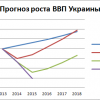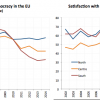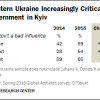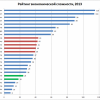 СМИ гудят обсуждениями пророчества Сороса. Учитывая его прошлые предсказания и среднюю доходность инвестиций за многолетнюю карьеру, это не удивительно. 81 год, а голова ясная. Философию можно пропустить, а интуицию Сороса игнорировать себе дороже...
СМИ гудят обсуждениями пророчества Сороса. Учитывая его прошлые предсказания и среднюю доходность инвестиций за многолетнюю карьеру, это не удивительно. 81 год, а голова ясная. Философию можно пропустить, а интуицию Сороса игнорировать себе дороже...There is a close parallel between the euro crisis and the international banking crisis that erupted in 1982. Then the international financial authorities did whatever was necessary to protect the banking system: they inflicted hardship on the periphery in order to protect the center. Now Germany and the other creditor countries are unknowingly playing the same role. The details differ but the idea is the same: the creditors are in effect shifting the burden of adjustment on to the debtor countries and avoiding their own responsibility for the imbalances. Interestingly, the terms “center” and “periphery” have crept into usage almost unnoticed. Just as in the 1980’s all the blame and burden is falling on the “periphery” and the responsibility of the “center” has never been properly acknowledged. Yet in the euro crisis the responsibility of the center is even greater than it was in 1982. The “center” is responsible for designing a flawed system, enacting flawed treaties, pursuing flawed policies and always doing too little too late. In the 1980’s Latin America suffered a lost decade; a similar fate now awaits Europe. That is the responsibility that Germany and the other creditor countries need to acknowledge. But there is no sign of this happening.
...
Financial institutions are increasingly reordering their European exposure along national lines just in case the region splits apart. Banks give preference to shedding assets outside their national borders and risk managers try to match assets and liabilities within national borders rather than within the eurozone as a whole. The indirect effect of this asset-liability matching is to reinforce the deleveraging process and to reduce the availability of credit, particularly to the small and medium enterprises which are the main source of employment.
...
In my judgment the authorities have a three months’ window during which they could still correct their mistakes and reverse the current trends. By the authorities I mean mainly the German government and the Bundesbank because in a crisis the creditors are in the driver’s seat and nothing can be done without German support.
I expect that the Greek public will be sufficiently frightened by the prospect of expulsion from the European Union that it will give a narrow majority of seats to a coalition that is ready to abide by the current agreement. But no government can meet the conditions so that the Greek crisis is liable to come to a climax in the fall. By that time the German economy will also be weakening so that Chancellor Merkel will find it even more difficult than today to persuade the German public to accept any additional European responsibilities. That is what creates a three months’ window.
Correcting the mistakes and reversing the trend would require some extraordinary policy measures to bring conditions back closer to normal, and bring relief to the financial markets and the banking system. These measures must, however, conform to the existing treaties.
...
It is impossible to predict the eventual outcome. As mentioned before, the gradual reordering of the financial system along national lines could make an orderly breakup of the euro possible in a few years’ time and, if it were not for the social and political dynamics, one could imagine a common market without a common currency. But the trends are clearly non-linear and an earlier breakup is bound to be disorderly.






Комментарии (0)